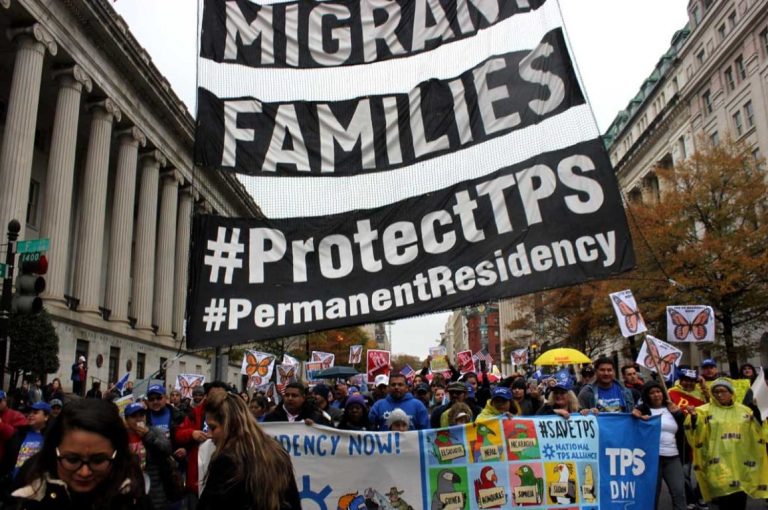14 de noviembre 2022

News About Sheynnis Palacios Not Covered by Media Operating in Nicaragua

PUBLICIDAD 1M
PUBLICIDAD 4D
PUBLICIDAD 5D
However, when that allotted period expires, they’ll be up in the air once again, amid the 2024 presidential campaign in the US

Thousands of protesters marched through the streets of Washington, DC, demanding temporary TPS protection for migrants, in November 2018. Photo: EFE
The United States has extended for 18 months the Temporary Protective Status (TPS) held by immigrants from six countries, including Nicaragua, El Salvador, and Honduras. Some 4,250 Nicaraguans are in the US with these protections, and their continued presence in the country depends on this decision.
The extension measure, which benefits a total of 260,000 migrants from El Salvador, Honduras, Nicaragua, Haiti, Nepal and Sudan, was announced on Thursday, November 10th, by the Department of Homeland Security (DHS). Those with TPS status now retain their right to work and live legally in the US, until June 2024.
This announcement was made less than two months before the current permission for these six nationalities was due to expire, on December 31.
The TPS’ers, as those protected by this benefit are known, have been involved in a legal dispute since the government of former U.S. president Donald Trump revoked the protective status of immigrants from these six countries.
Last week, talks between the current US administration and lawyers representing a group of TPS beneficiaries officially collapsed, leaving thousands of migrants in limbo.
In 2018, a federal court in California ruled in favor of the immigrants, declaring that ex-President Trump ended TPS to those six countries in an illegal manner and for racist motives.
TPS is a temporary immigration benefit that grants protected status to people coming from countries that are facing emergencies such as natural disasters or wars.
The US has currently granted TPS to residents of 15 countries of the world, among them Ethiopia, Afghanistan and Ukraine, the latest ones announced this year. A total of around 400,000 people are benefitted by this program nationally.
While the extension of their legal status was good news to the Nicaraguan “TPS’ers”, it doesn’t represent a definitive solution that would finally allow them to apply for permanent legal status. “The problem is, there’s no legal path to residency,” stated Carolina Sediles, a volunteer with the Nicaraguan-American Human Rights Alliance (Nahra), and herself a beneficiary of TPS.
Sediles describes what will happen in June 2024: once again, there’ll be discussions about whether or not to renew their TPS status. They’ll have to go back to the courts to rule on the issue. In addition, the topic will once more spark public debate amid the run-up to the US 2024 presidential campaign. This will certainly cause greater tensions, since in the United States everything related to immigration is mired in polarization between Democrats and Republicans.
“Unfortunately, at election time we “TPS’ers are just pawns in the political parties’ game, and we’re in their hands. No one makes a permanent decision because the other side never accepts it. Doing so would have to form part of an overall immigration reform, so it’s a complex topic,” Sediles noted.
“Yes, it’s good news, although we TPS’ers and the DACA beneficiaries [program granting temporary status to immigrants brought to the US illegally as children] are always hoping for a more permanent solution. At this moment, in which we were on a tightrope, the extension gives us a certain relief, in the sense that we have some time to be able to seek other long-term options, in case they end up cancelling the TPS program,” Sediles explained.
“It’s important to clarify that this isn’t a new designation of TPS. I’ve seen news bulletins that say they’re expanding TPS, which is incorrect. Nothing has been broadened. This decision only affects the current group of 4,250 Nicaraguans with TPS status, plus those of the other countries. At this time, those without legal status don’t qualify for anything under this extension of our permission to remain,” the Nicaraguan added.
NAHRA and other organizations that work for immigrant rights in the US are fighting to achieve permanent residency for these Nicaraguans who’ve lived in the country for over two decades, and allow a broader TPS designation for Nicaraguans who entered after 2018, due to the sociopolitical crisis in Nicaragua caused by the government repression.
This article was originally published in Spanish in Confidencial and translated by Havana Times.
PUBLICIDAD 3M
Confidencial es un diario digital nicaragüense, de formato multimedia, fundado por Carlos F. Chamorro en junio de 1996. Inició como un semanario impreso y hoy es un medio de referencia regional con información, análisis, entrevistas, perfiles, reportajes e investigaciones sobre Nicaragua, informando desde el exilio por la persecución política de la dictadura de Daniel Ortega y Rosario Murillo.
PUBLICIDAD 3D